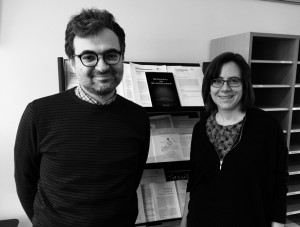The embodied affective dimension of collective intentionality

In recent philosophical debates, the peculiar aspects of collective intentionality or we-consciousness are regarded as foundations of human society.
These discussions of collective intentionality, however, have been largely dominated by accounts of planning and acting, of explicitly intending to do something together. According to such accounts, we-consciousness is mainly a matter of the cognitive and conative structures of the mind.
Only more recently, the interest in the structures of collective affective intentionality has grown. But is affective sharing only a special case of a more general form of we-consciousness or is it, as one of the central hypotheses underlying my project would suggest, something original in its own right?

 What perfect timing for Alessandro Salice (University College Cork) to come back to the Center as a visiting researcher! It is with great pride and joy that both of us announce the publication of our most recent article on “
What perfect timing for Alessandro Salice (University College Cork) to come back to the Center as a visiting researcher! It is with great pride and joy that both of us announce the publication of our most recent article on “ For the past three months, it has been my great pleasure and honor to be a visiting researcher at the Center for Subjectivity Research. During my time in Copenhagen, I have advanced work on my dissertation, Pointing the Way to Speech: The Sources of Linguistic Intentionality.
For the past three months, it has been my great pleasure and honor to be a visiting researcher at the Center for Subjectivity Research. During my time in Copenhagen, I have advanced work on my dissertation, Pointing the Way to Speech: The Sources of Linguistic Intentionality. A great deal of a human life normally happens in contact with other people, and as part of living together we often talk about ‘sharing’ a variety of experiences and attitudes with others. For example, we talk about ‘sharing’ emotions, beliefs, and intentions with other people. On occasions, sharing an intention to do something together, say to go to the movies, is a basis for going to the movies together. If two friends end up going accidentally to the movies at the same place and time, we wouldn’t normally say that they went to the movies together – at least not in the same sense in which we would say that if they had shared an intention to do so, and coordinated their actions in such a way that meeting at the movies results from a mutual agreement. While perhaps intuitively plausible, the idea that (some) mental phenomena could be shared in a robust (non metaphorical) way is likely to raise some eyebrows. What could sharing possibly mean in the context of mentality?
A great deal of a human life normally happens in contact with other people, and as part of living together we often talk about ‘sharing’ a variety of experiences and attitudes with others. For example, we talk about ‘sharing’ emotions, beliefs, and intentions with other people. On occasions, sharing an intention to do something together, say to go to the movies, is a basis for going to the movies together. If two friends end up going accidentally to the movies at the same place and time, we wouldn’t normally say that they went to the movies together – at least not in the same sense in which we would say that if they had shared an intention to do so, and coordinated their actions in such a way that meeting at the movies results from a mutual agreement. While perhaps intuitively plausible, the idea that (some) mental phenomena could be shared in a robust (non metaphorical) way is likely to raise some eyebrows. What could sharing possibly mean in the context of mentality?